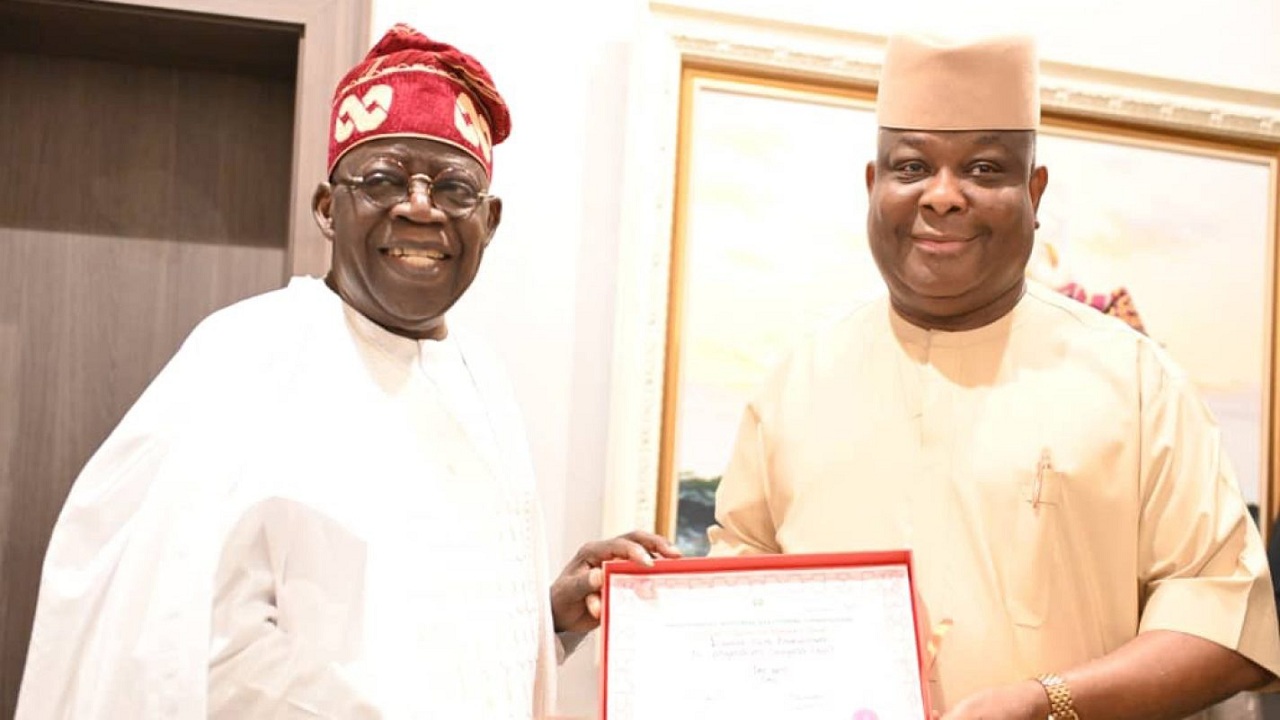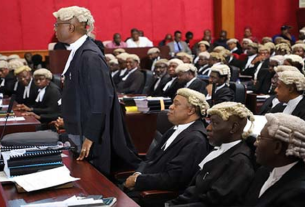Senator-elect representing Imo West and a candidate for Senate President in the 10th National Assembly, Osita Izunazo (right) presenting his Certificate of Return to the President-elect, Bola Ahmed Tinubu, at his Asokoro, Abuja, residence…yesterday
- Tinubu inspects Defence House
- Ex-lawmakers flay interference by executive arm of govt
President-elect, Bola Tinubu, yesterday, inspected his official residence before his May 29 official inauguration as President.
This came as threats to resort to zoning by aspirants desperate for leadership positions in the 10th National Assembly trouble the ruling All Progressives Congress (APC), prompting a meeting of the President-elect, Bola Tinubu, and Vice President-elect, Kashim Shettima, with the Chairman of the party, Abdullahi Adamu, and some members of the National Working Committee (NWC).
The meeting, it was gathered, was to finalise zoning arrangements for National Assembly leadership positions. The meeting included President of the Senate, Ahmad Lawan, Speaker of the House of Representatives, Femi Gbajabiamila, and some APC governors.
The activities of some desperate aspirants seeking election as presiding officers, however, may jeopardise the process.
Reliable sources said what necessitated the meeting was ongoing intensive lobbying.
The presence of Senators Godswill Akpabio, Barau Jibrin, Opeyemi Bamidele, Solomon Adeola, Tokunbo Abiru and Ekiti State Governor, Biodun Oyebanji, around the President-elect, on his return to Nigeria, sent disturbing signals to some stakeholders.
Their presence, which coincided with arrival of the APC National Chairman and Secretary, Abdullahi Adamu and Iyiola Omisore, with other NWC members at Tinubu’s residence, was misconstrued to mean the President-elect and the APC were already holding meetings with aspirants for National Assembly leadership positions.
A source at the Tuesday meeting indicated Tinubu told the APC chiefs that they should consider a Christian from the South-South geopolitical zone as Senate President, while the Speaker of the House of Representatives should be zoned to North West.
Tinubu, according to the source, met the senators individually and told them what he had discussed with the party hierarchy.
The source said: “It was at that stage that Jibrin, who is contesting the Senate President position, came outside the meeting to discuss with Senators Bamidele and Adeola. Jibrin was told by his colleagues to take things easy as they could help him prevail on Tinubu.
“Jibrin, who had arrived Tinubu’s residence as early as 9:00 a.m., had opportunity of meeting with the President-elect for a second time, where he offered to be Deputy Senate President.”
The source said colleagues in attendance endorsed Bamidele as Senate Leader, while Adeola would be Chairman of Appropriation. Abiru was tipped as Chairman, Committee on Banking.
It was further learnt that Tinubu asked them to meet with Lawan, so that he could champion the Akpabio/Barau Senate Presidency campaign.
The source said: “Tinubu had earlier put a call across to Lawan, to see him on the matter and it was reliably gathered that the Senate President told the President-elect that it would be difficult to market an Akpabio, who allegedly denigrated the 8th Senate by forcing his way to be the Minority Leader as a first timer, and also accused National Assembly members of receiving huge amounts of money from the Niger Delta Development Commission to approve the agency’s budget.
Meanwhile, a group of former National Assembly members rose from an emergency meeting, yesterday, warning against interference by the executive arm of government in the choice of principal officers of the federal legislature.
Following a one-day sensitisation parley with some state House of Assembly members-elect in Jos, Plateau State, the ex-legislators called on the leadership of various political parties, president and governors-elect to insist on merit in the election of principal officers of the National Assembly.
In a communique signed by Golu Timothy, former Chief Whip of the Plateau State House of Assembly and Member of the 8th House of Representatives, the former legislators, including senators, House of Representatives members, state Assembly Principal Officers and other resource persons, contended that executive offices are different from legislative positions, hence, the National Assembly must exist as an independent body.
They advocated democratic principles of separation of powers, checks and balances, and underscored the need to allow members-elect exercise their franchise without interference.
The ex-lawmakers said allowing the natural course of leadership change brings better harmony and understanding, mutual respect and less politicisation.
They agreed that fielding legislative officers from the same zone as executive officers should not be an issue because they have different roles and responsibilities, and would be assessed based on their respective constitutionally assigned duties.
The ex-lawmakers noted that the practice where the executive seeks to impose legislative leadership across the nation has caused more harm than good to the legislature, resulting in instability and inefficiency.
They said the trend should no longer be encouraged in the 21st century and, especially, in Nigeria where the election of legislators has been unprecedentedly multi-party based.
“Look at how the election of legislators went across the country in the just concluded 2023 general elections. People were voted, not according to party, but personalities involved.
“If party considerations were less a factor in the just concluded general elections, why must our political parties and their leadership zone legislative offices? Such will not bring any expected result but crisis of confidence,” the former legislators said.
They added: “It is no longer fashionable for the executive to interfere with leadership decisions of the legislature at any level. Legislators have come of age in the country and must be allowed to do their things.
“When we have people, elected, and you want to decide their leadership, it is undemocratic. The experiences of the legislature are quite different from those of the executive.”
The Guardian





